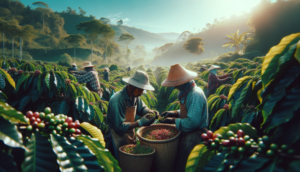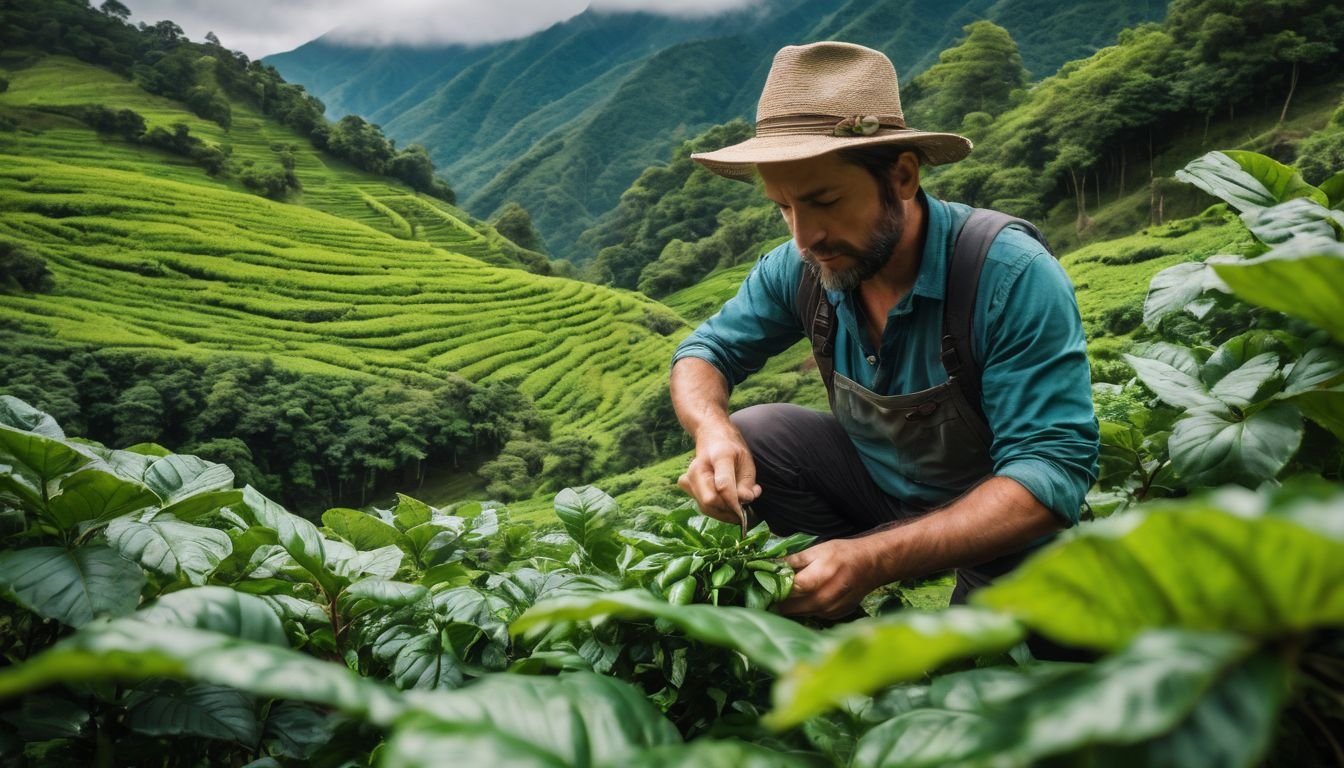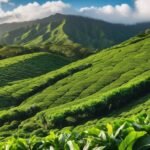The specialty coffee industry has seen immense growth in recent years, with consumers becoming more quality-conscious and desiring transparency about where their coffee comes from. As sustainability and ethical sourcing practices gain prominence among roasters and retailers, many wonder whether the booming specialty coffee sector also promises more organic options. The buzz around organic coffee is getting louder, but what exactly does that label mean?
When we talk about organic coffee, we’re referring to beans grown without synthetic fertilizers or pesticides and in a way that supports our planet’s health.
How do you know if coffee is organic?
To determine if coffee is organic, you can look for specific indicators:
- Certification Labels: The most reliable way to know if coffee is organic is to look for official organic certification labels. These labels are provided by recognized organizations and ensure that the coffee meets specific organic standards. Common certifications include USDA Organic (United States), EU Organic (European Union), and JAS Organic (Japan). Each region has its own certifying body and standards.
- Production Information: If the coffee packaging provides detailed information about how the coffee was grown, including the avoidance of synthetic pesticides and fertilizers, it’s a good indication of organic practices.
- Traceability: Some coffee brands offer traceability which allows consumers to track the coffee’s journey from farm to cup. This can provide insights into the farming practices used.
- Retailer Information If you’re buying from a coffee shop or a specialty coffee retailer , you can ask the staff about the coffee’s organic status. They often have detailed information about their products.
- Organic Coffee Farms: Buying directly from organic coffee farms or cooperatives, if possible, is another way to ensure the coffee is organic. These farms typically follow organic practices and are often certified.
- Price and Quality: Organic coffee often comes at a premium price due to the more expensive farming practices and certifications involved. However, price alone isn’t a reliable indicator, so it’s best to look for other signs as well.
Remember, organic certification focuses on the farming process (like avoiding synthetic pesticides and fertilizers) rather than the end quality of the coffee. Always check for reputable certifications to ensure the coffee you’re purchasing is genuinely organic.
For those who love their cup of joe, the connection between sustainability and the taste of specialty coffee has become a hot topic. The rise of organic specialty coffee goes hand-in-hand with consumers’ growing demand for ethical and eco-friendly products.
Nowadays, certified organic coffees come with promises—like being produced following strict guidelines and often linked to fair trade practices. But there are hurdles: getting certified as organic can take growers up to three years and hit hard on their finances.
Meanwhile, roasters face additional costs from record-keeping requirements needed for certification.
Triple-shot espresso isn’t the only thing causing a stir; double certifications like Fairtrade plus Organic lead to heftier price tags on your morning brew. However, it’s not just about labels—many farmers opt for sustainable agriculture regardless of whether they’re officially certified because these methods improve both environmental quality and bean flavor.
As you explore this article further, prepare to unlock surprising truths about what really goes into an organically labeled bag of beans—and how small roasters tackle the giant task of meeting certifying standards without breaking the bank.
Let’s steam ahead into uncovering more!
Key Takeaways
- Certified organic coffee means the beans are produced without synthetic pesticides and fertilizers, following standards set by bodies like the USDA.
- Small farmers may opt for organically – grown coffee practices that focus on sustainability without undergoing formal certification due to high costs and challenges.
- Sustainability in coffee farming leads to improved bean quality and supports environmental health by promoting biodiversity and soil fertility.
- Direct trade relationships offer an alternative to organic certification, allowing small roasters to source sustainable coffee while supporting farmers directly.
- Organic certification is complex and cost – prohibitive for many, but its importance lies in ecological protection and providing consumers with a trusted label.
What Does “Organic Coffee” Really Mean?

Understanding organic certification in the coffee industry is crucial to know what “organic coffee” truly means. It’s important to differentiate between certified organic and organically-grown coffee, as well as the impact of sustainability on the quality and production of specialty coffee.
Understanding organic certification in the coffee industry
Organic certification is a crucial process in the coffee industry, setting strict regulations for growers to follow if they wish to label their product as “certified organic.” This involves adhering to sustainable practices that promote biodiversity and reduce environmental impact.
Coffee farms undergo rigorous assessments by certifying agencies like the United States Department of Agriculture (USDA) to ensure these standards are met. They must avoid the use of synthetic pesticides and fertilizers, maintain soil fertility naturally, and often employ shade-grown techniques that preserve forest canopies.
Certification not only supports environmental health but also connects farmers directly with markets that value ethical sourcing and sustainability. Consumers increasingly seek out USDA-certified organic labels as a mark of quality and responsible cultivation.
This trend has led to significant growth in certified organic coffee production worldwide, reflecting consumer demand for more sustainable options.
Farmers face challenges due to the complexities associated with gaining organic certification—challenges which include meeting meticulous standards over multiple years before being eligible for certification.
Even so, many dedicated producers persevere because they see the benefits: better access to high-value markets, improved farm ecosystems, and potential economic advantages compared against conventional farming methods.
These efforts help make strides toward more ethical food systems where both people and nature thrive together.
Differences between certified organic and organically-grown coffee
Certified organic coffee carries a label that guarantees it has been produced according to specific regulations. To earn this distinction, farms must avoid all synthetic pesticides and herbicides, relying on natural methods for pest and weed control.
This ensures the beans are free from harmful chemicals, aligning with strict standards overseen by official certification bodies like the USDA. The process not only protects consumers but also supports environmental sustainability by preserving soil health and ecosystem balance.
On the other hand, organically-grown coffee refers to beans grown with an intention of reducing chemical use; however, they may not completely eliminate them. These farming practices often aim for improved sustainability but lack formal certification due to various reasons such as high costs or bureaucratic challenges faced by smaller farms.
Despite these obstacles, many growers still commit to reduced-chemical cultivation methods that benefit both people and planet.
Fair trade associations frequently underscore certified organic coffees. This partnership enhances social responsibility in the supply chain, ensuring equitable compensation for farmers’ laborious efforts in growing your cherished cup of joe under shade trees—benefits that might not be standard for organically-grown counterparts.
Through fair-trade relationships, roasteries can offer traceability and ethical business practices that honor those tending to robusta beans or aromatic arabicas amidst diverse bird habitats on biodiverse landscapes far away.
Is specialty grade coffee organic?
Specialty coffee is known for its premium quality and flavor clarity. But does achieving specialty grade require beans to be organic?
Not necessarily. While some specialty coffee is organic, the term refers more to cupping score based on aroma, acidity, body and other attributes. So specialty coffee could come from organic or conventional farms as long as flavor meets quality standards.
Exploring the Rise in Popularity of Organic Specialty Coffee
The rise in popularity of organic specialty coffee has been driven by a growing awareness of s ustainability and the impact of coffee production on the environment. As consumers become more conscious of the origin and quality of their coffee, there is a greater demand for organically-grown beans that are ethically sourced and environmentally friendly.
ustainability and the impact of coffee production on the environment. As consumers become more conscious of the origin and quality of their coffee, there is a greater demand for organically-grown beans that are ethically sourced and environmentally friendly.
The impact of sustainability on the coffee industry
Sustainability has become a driving force in shaping the future of the coffee industry. Coffee farms that adopt sustainable agricultural practices are not only helping to reduce their environmental footprint but also improving the quality of their beans. These eco-friendly methods often include shade-grown techniques and organic farming, which enhance biodiversity and maintain soil health.
Adopting energy-efficient processes and infrastructure allows roasteries to minimize waste while maximizing flavor. This commitment to the environment resonates with consumers who seek out sustainably-grown coffee for its taste as well as its ethical value.
Sustainability refers to the concept of meeting present needs without compromising the future, requiring a long-term outlook to coffee production. It encompasses environmental sustainability, economic sustainability for farmers, and social sustainability for farm workers and their communities. These aspects are critical in producing ethically sourced coffee.
Many factors threaten the sustainability of coffee farming, including climate change impacts on suitable growing regions, deforestation, soil depletion, overreliance on coffee as a cash crop, and pest and fungus outbreaks worsened by climate change.
To combat these challenges, coffee producers are increasingly turning to regenerative growing practices. These include minimizing chemical inputs, planting shade trees, mulching, composting, and watershed conservation, all aimed at creating resilience for coffee producers.
As consumers become more sustainability-conscious, the specialty coffee sector is responding by investing in ethical sourcing and innovative sustainability initiatives. Small specialty roasters differentiate themselves from large commodity coffee brands through their close relationships with growers and transparency about sourcing.
Many leading specialty coffee companies now publish annual sustainability reports detailing their progress on core issues like carbon reduction, responsible water use, and improving farmer livelihoods. These efforts are crucial in maintaining a sustainable and ethical coffee industry.
| Sustainability Indicator | Example of Progress in Specialty Coffee Sector |
|---|---|
| Carbon emissions reduction | Investing in renewable energy, efficient equipment, offsetting emissions through community-based agroforestry programs |
| Water conservation and quality | Improving wastewater treatment, providing growers with tools and training for water management and water quality testing |
| Soil health and fertility | Promoting regenerative techniques like cover cropping, compost integration, reduced tillage methods |
| Biodiversity protection | Preventing deforestation through forest conservation programs, agroforestry, planting native shade species |
| Farmer profitability and food security | Offering credit, transition assistance, and premiums for certified products; supporting crop diversification and home gardens |
| Community health and education | Funding mobile health clinics, nutrition programs, school construction, scholarships for farm families |
As demonstrated by these efforts, the specialty coffee industry has made sustainability core to its identity and future resilience. Promoting organic agriculture aligns with many of these priorities.
The relationship between sustainability and quality
Sustainability and quality share a fundamental connection in the coffee industry. As sustainability practices become more prevalent among coffee growers, the quality of the beans also improves.
Sustainable farming methods, such as shade-growing and regenerative farming, not only benefit the environment but also enhance the flavor profile of the coffee beans. Moreover, these practices contribute to preserving terroir characteristics and result in healthier soil, which ultimately impacts the overall quality of coffee.
It’s imperative to understand that sustainable agricultural practices often lead to improved economic outcomes for farmers. By promoting sustainable farming methods, farmers can secure better prices for their premium-quality organic coffee beans while contributing to environmental conservation efforts.
Challenges with Organic Certification
Obtaining organic certification can be complex and costly for coffee producers, leading to challenges in meeting the requirements. Alternative systems for promoting sustainability, such as direct trade relationships, are emerging as a way to support small and medium-sized roasters in sourcing high-quality organic coffee.
The complexities of obtaining organic certification
Obtaining organic certification for coffee can be a lengthy and challenging process. It may take up to three years for farmers to acquire this certification, with the procedure itself presenting significant obstacles.
Qualifying expenses include:
- Initial and recurring inspection fees
- Periodic water and soil testing
- Investments to improve infrastructure and equipment to meet certification criteria
- Detailed documentation for audit verification
The conversion from conventional to certified organic farming takes several years, during which farmers bear the costs associated with organic practices without the benefits of premium organic pricing. This makes the certification financially daunting, especially for small growers. Cooperative groups sometimes consolidate resources for group certification, yet the administrative burden remains significant.
Maintaining certification adds further complexity. For example, becoming a USDA certified organic coffee roasting facility requires maintaining extensive records, leading to additional labor costs.
Similarly, value-added processors (handlers) of organic-certified coffees also need their own certification, adding further intricacies and expenses to the overall process.
Limited awareness of the steps to transition to organic and lack of agronomic training also impede adoption. Technical assistance programs through coffee buyers, NGOs, and extension services remain under-resourced to reach the volumes of smallholders needing guidance.
Alternative systems for promoting sustainability
In recognition of the barriers with formal certification, alternative verification systems have emerged to promote sustainable coffee production. These include:
Rainforest Alliance Certification
Rainforest Alliance is an international nonprofit advancing sustainability in agriculture and business. Their certification of coffee farms audits performance on criteria spanning conservation, labor rights, agrochemical restrictions, water and waste management, and living conditions for workers.
As Rainforest Alliance standards aren’t as stringent as USDA Organic regulations, they may serve as a stepping stone for farmers aspiring toward organic practices. Rainforest Alliance certification may also benefit farmers seeking to differentiate themselves through sustainability commitments without undertaking full organic certification.
Smithsonian Bird Friendly® seal
This distinct certification administered by the Smithsonian Migratory Bird Center verifies that coffee farms meet standards supporting forest conservation and canopy tree diversity for bird habitats. The Bird Friendly program directly connects biodiversity preservation to sustainable coffee sourcing.
Fair Trade certification
While not focused directly on organic practices, Fair Trade empowers small scale farmers through equitable trading standards including price floors, premiums for community development, and long-term contracts with buyers. These assurances provide stability for farmers to potentially invest in expanding environmentally sustainable methods.
Direct Trade relationships
Many specialty coffee roasters tout their Direct Trade partnerships with growers instead of formal certifications. This facilitates visiting farms, knowing producers personally, and observing agricultural practices firsthand. It allows the opportunity to support individual growers in transitioning toward organic production through consulting, equipment upgrades, or cost sharing of certification expenses.
The importance of human connections in the production of coffee
Human connections are vital in the production of coffee, as they enable collaboration between farmers and producers to maintain quality and sustainability. Farmers cultivate organic coffee through close relationships with producers, ensuring that the stringent standards for organic certification are met.
This collaborative effort promotes not only the health benefits associated with organic agriculture but also a sustainable approach to coffee production .
Partnerships between farmers and producers play a crucial role in promoting education and understanding within the industry. These interpersonal connections facilitate an exchange of knowledge on shade-grown coffees, maximizing residue levels, and other key aspects of certified organic farms.
Conclusion: The Truth About Certified Organic Coffee and its Availability Among Small and Medium-Sized Roasters
After exploring the complexities of organic certification in the coffee industry, it’s evident that obtaining certification is intricate and challenging. In this cultural wave of coffee, the rise in popularity of organic specialty coffee has sparked a dialogue about sustainable farming practices and their intrinsic link to quality.
Despite challenges, small and medium-sized roasters are actively navigating the world of certifications to promote sustainability. Can we encourage a shift towards supporting farmers who uphold sustainable and organic practices? How can consumers play a role in advocating for certified organic coffee from dedicated producers? Embracing these inquiries provides an opportunity for positive change within the specialty coffee industry.
Let’s pledge to support efforts towards promoting regenerative agricultural practices for the benefit of both farmers and consumers alike!
FAQs
1. What does it mean for coffee to be organically grown?
Organically grown coffee is cultivated without synthetic pesticides or chemicals, striving to preserve the environment and sustain the health of the soil.
2. How do organic certifications affect my roasted coffee?
Organic certifications ensure that your roasted coffee meets stringent standards, including maximum residue levels of chemicals, promoting a pure taste without harmful aftertaste.
3. Why should I choose organic robusta or arabica beans from a certified roastery?
Selecting organic robusta or arabica beans from a certified roastery guarantees high-quality coffee produced with eco-friendly practices that combat deforestation and chemical dependency.
4. Does Swiss Water Process relate to organic coffee?
The Swiss Water Process is a chemical-free method used to decaffeinate green coffee beans, aligning with the principles of producing organically certifiable specialty coffees.






